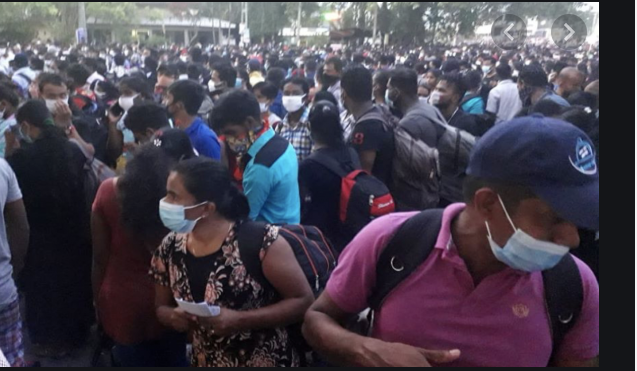
By: AswathyNair
The COVID 19 induced crisis in migrant labour should prompt a re-think in how Sri Lanka should train and manage its overseas workers, a top official said.
Secretary to the Ministry of Foreign Relations Ravinatha Aryasinha in a recent speech has said that the present crisis in foreign labour “has been an eye-opener” in many respects.
Tens of thousands of migrant Sri Lankan workers are facing a crisis in several countries, particularly the Middle-East, and are seeking to return.
Aryasinha in a speech to the Organization of Professional Associations has said it is an opportunity to correct structural, procedural and human interface incongruities in Sri Lanka’s labour migration.
He said that the future “footprint of Foreign Employment Sri Lanka will provide the world – though probably Smaller, could be Smarter and more Sustainable.”
Sri Lanka found that a large number of its workers overseas were illegals, unable to access healthcare and other benefits.
This made them very vulnerable and prone to neglect in the host countries.
Sources EconomyNext spoke to said that a large number had come to these host countries on visit visas and when their jobs ended due to the COVID 19 situation found that they had no institutional support.
Secretary Aryasinha said the Covid-19 crisis had “exposed the significant number of Sri Lankan migrant workers abroad who are undocumented/irregular, and as a result, are ineligible to avail of medical and other benefits in their host countries, and are also vulnerable to deportation if identified.”
Many of the Sri Lankan workers were also not registered with the Sri Lanka Bureau of Foreign Employment.
Aryasinha urged that they register so that they enjoy the benefits of an expanded social safety net, as successfully practised by migrant workers in countries like the Philippines, where the percentage of registered migrant workers is nearly 97 per cent.
He said, even for those who are legal, a consequence of Covid-19 has been the shrinking of the employment market, particularly with the increasing cases of unemployment, loss of contracts, non-extension of work permits and halting of temporary freelance work, which have left many of them largely destitute.
It was noted that this could lead to a serious shortfall in the numbers of migrant workers who will leave for work this year and in turn a drop in worker remittances.
Last year migrant worker’s remittances to foreign exchange earnings was 25.5 %, while its contribution to Sri Lanka’s GDP was approximately 8%.
Aryasinha suggested several measures to improve the situation
– ensuring the outward flow of a better trained and skilled migrant worker, one who will while able to earn more, is less likely to face the vulnerabilities presently encountered by the average Sri Lankan migrant worker, particularly the unskilled workers,
– combine market research platforms to generate vocational training programmes that will serve future job markets and economic demands in countries post Covid-19, and recalibrate to inspire a workforce that meets that demand,
– re-formulate our education systems, and re-orient students to be a rich human resource pool for future labour markets,
– expedite action in enhancing cheaper, safer and faster modes of remittance flows,
– ensure that ‘migrant health’ becomes a cornerstone in the management of migrant populations.
